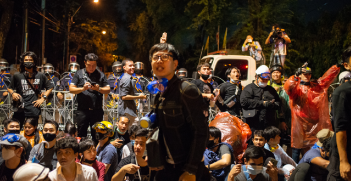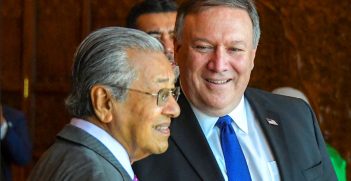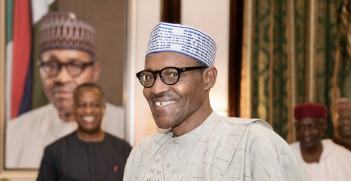Digging in for the Long Haul: the Meaning of Putin’s Latest Spring Surprise
No one could ever deny Vladimir Putin’s ability to surprise. Russia’s leader has the ability to pull rabbits out of his hat just as Western commentators dismiss the Kremlin’s waning influence.
In no small measure, surprises such as the annexation of the Crimea and destabilisation of the Donbas in 2014 and the intervention in Syria in 2015 point to a long-standing paradox in Russian foreign policy. On the one hand, they bring to the fore its broader strategic weakness: in each of these instances, Russian allies had either been forced out, or found themselves confronted with imminent defeat. On the other hand, Moscow’s penchant for the unexpected showed the extent to which it was still adept at the art of the tactical: the ability to unpredictably react to these unfavourable developments, and at least partially prevent – from the narrow perspective of its particular zero-sum worldview – a total forced retreat.
This ability to surprise – and to keep the West guessing on his intentions – is crucial to Putin’s success. The Russian leader vaguely talks of “red lines” but then remains coy about where, exactly, these “red lines” are situated, beyond the by-now well known general prohibition on NATO membership for former Soviet states. He rattles his sabre by menacingly moving troops and materiel towards the Ukrainian border, but Putin and his entourage remain vague about the reasons – and, of course, their intentions. Is Putin signalling his displeasure? If so, his displeasure with what, exactly? Testing the new Biden administration, perhaps? Or is it something more serious – for instance, a full-scale invasion of Ukraine in reaction to God knows which perceived infraction by his hapless Western neighbour? Analysts and policymakers end up speculating wildly in confusion; Ukraine’s leadership calls for a concrete roadmap towards NATO membership, in vain; and NATO allies themselves advocate divergent reactions based on interpretations born of their equally divergent interests.
And this may very well have been the point to begin with. All of these alternative explanations for Russia’s build-up were plausible. The end effect – of resulting confusion and division in the Western camp – is the only thing that remains as an incontestable fact. For a relatively weak party which has, in the past, based its “successes” on the dual elements of surprise and plausible deniability, it makes sense to confuse, to blow hot and cold, and to obfuscate. Apart from these immediate effects, it prepares the ground for more serious, future rounds of confrontation: next time Russia masses troops somewhere, speculation will, once again, run rampant. Only, that time, it will be easier to accuse those making worst-case assumptions of “crying wolf.” Confusion is enhanced, deniability reinforced, the element of surprise maintained – when and where it matters most.
This shows a fundamental weakness in the West’s approaches towards the former Soviet space: its stale, formulaic predictability. Some have disparagingly suggested that, while the Kremlin plays chess, the West’s game has descended to one of chequers; but far from being apt, this analogy makes the fundamental mistake that both sides play by equally transparent, predictable set of – differing – rules, when they clearly don’t.
Over the past few decades, Moscow has thrown all the rules that used to govern interaction in Eastern Europe out the window – except for one overarching priority: thwarting Western encroachment into its perceived “sphere of special interests.” In the process, its measure of success has come to be defined negatively, on something not occurring. The West, meanwhile, continues playing a game whose rules are rigid, directed towards a number of positive goals, with NATO membership as the ultimate “win,” and with the successful democratisation and Westernisation of candidate countries as intermediate aims.
Consequently, its targets are clearly delineated, the bar set relatively low, and all Moscow has to do in places like Ukraine, and Georgia is to disrupt and destabilise, sabotage and intimidate. This is an approach it can also apply to Western societies. From the occasional rattling of the sabre, to disinformation campaigns and the corruption of democratic politics, every weakness in opponents’ body politic is exploited to sew confusion and division.
The West’s responses, meanwhile, draw on a very limited arsenal: the expulsion of diplomats, the provision of weapons, and economic sanctions, which, in a world marked by shrinking Western economic hegemony, have become the “default” response to anything disturbing the “rules-based order” to a pathological degree. Not surprisingly, all of these have had – and will likely have – a limited effect in changing Russia’s fundamental behaviours, when territorially defined core interest, regime survival and status are at play, and when such eventualities are pushed for with much noise and fanfare.
The solution might consist of either abandoning the goals or rethinking some of the more predictable responses that have governed Western behaviour for several decades now. When measures of success are defined too ambitiously – for instance, as eventual NATO membership – and policy choices are overly constrained – in the West’s case, by a clear, liberal, normative imperative – one, or the other, or both have to be rethought.
The liberal international order is in crisis, and the world has become more unpredictable. To pretend that, given a few well-rehearsed, pre-announced policy moves, the world – and Russia in particular – will return to an “old normal” whose preconditions lay in the past is not the answer. Digging in for the long haul, acknowledging that anarchy unchained may be the new normal, defining one’s goals realistically, and regaining the element of surprise – in the way demonstrated by Putin, time and again – may be the way to respond to the Russia challenge in 2021 and beyond.
Dr Kevork Oskanian is a Honorary Research Fellow at the University of Birmingham, UK. His current research interests include Eurasian politics and security, postcolonial and civilisational perspectives on Russian narratives of “exceptionalism,” as well as post-liberal approaches to state and International Society in Eurasia and beyond.
This article is published under a Creative Commons Licence and may be republished with attribution.





